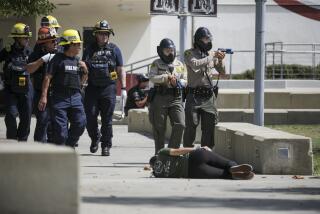Amid middle school shooting, a debate rages over random weapons searches at L.A. campuses
The shooting Thursday at a middle school in the Westlake area comes amid a debate in the Los Angeles Unified School District about the effectiveness and fairness of random searches for weapons on campuses.
LAUSD is the only school district its size that requires every middle and high school campus to conduct daily random searches for weapons using metal-detector wands.
But some local activists are pushing to end the random searches, saying there is little consistency in the way they are conducted or evidence that they are useful or necessary.
Times education writer Sonali Kohli explored the debate in December. Here are some of the findings:
What the searches are like
The district began random searches in 1993 after a 16-year-old was shot and killed at Fairfax High School. A month later, a student died in a shooting at Reseda High School.
The district began requiring the daily searches with metal-detector wands in 2011 after two students were injured in a shooting at Gardena High School, district officials said.
What the data show
An internal district audit of 20 schools released in April found inconsistencies in how random searches were conducted. Some schools didn’t have daily searches, the audit found. One-fourth didn’t have enough metal-detector wands to search properly.
Interviews with teachers, students and administrators also indicate that elements of the searches — from who gets picked to be searched to how the search is done — are not uniform across the school system.
The nonprofit InnerCity Struggle, which works to promote safe, healthy communities on L.A.’s Eastside, and the advocacy law firm Public Counsel asked the district for logs of random searches at schools where weapons had been confiscated. The district provided logs for 59 schools, fewer than a quarter of LAUSD’s middle and high schools. The records may not show all the searches at those 59 schools because they asked for logs only when weapons were found.
UCLA’s Civil Rights Project recently analyzed records of searches conducted from 2013 to 2015 and determined that they cover about 5,400 searches, with about 34,000 searches of students. Administrators, according to the analysis, confiscated many more school supplies than they did guns (0) and knives (37) during random searches.
According to data from the UCLA analysis, schools choose an average of six students for every search. But that number can vary widely. In 2015, North Hollywood High School randomly searched 100 students on April 20, a day in which many people celebrate marijuana. They found one lighter and a few permanent markers, according to the records, but no drugs.
Questions over selection
Some district teachers and students say that searches are less common in advanced placement, honors and magnet classrooms. Those classes often have more white students, which means nonwhite students in other classes could be targeted more frequently.
Although schools are required to keep logs of searches and include anything that was confiscated, they do not record what type of class is searched or the gender or race of students searched. Campbell said the district has no evidence that magnet schools and AP classes are not being searched regularly.
More to Read
Sign up for Essential California
The most important California stories and recommendations in your inbox every morning.
You may occasionally receive promotional content from the Los Angeles Times.









